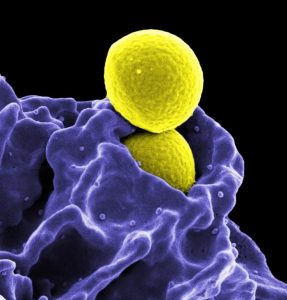By NewsDesk @infectiousdiseasenews
UF medicinal chemists report promising results from a study focused on new ways to of treating several types of antibiotic-resistant bacteria, advances that may help in the battle against MRSA, tuberculosis and other infectious pathogens.

Image/NIAID
Lead investigator Robert Huigens, Ph.D., an associate professor of medicinal chemistry in the UF College of Pharmacy and a member of the UF Health Cancer Center, synthesized a new series of more than 20 different halogenated phenazine, or HP, small molecules with his team.
“HP small molecules could lead to critical advances in the treatment of significant infections, including wounds and chronic infections,” he said. The research was the focus of the cover story in the American Chemical Society’s Journal of Medicinal Chemistry.
- Nevada: First case of Hantavirus Pulmonary Syndrome reported in Douglas County
- Michigan reports first hantavirus case
- Denver: ‘Officers have already responded to calls this spring in which people brought baby raccoons into their homes and played with them, which presents a serious rabies risk’
- North Carolina: Significant increase in hepatitis A cases in Gaston County
- Smallpox vaccine to be supplied in response to new cases of monkeypox in the UK
- Colorado: Plague confirmed in Boulder County cat
- Rabid raccoon reported in Cape Cod for 1st time in 8 years


One thought on “University of Florida study looks at new ways to treat antibiotic-resistant bacteria like MRSA”